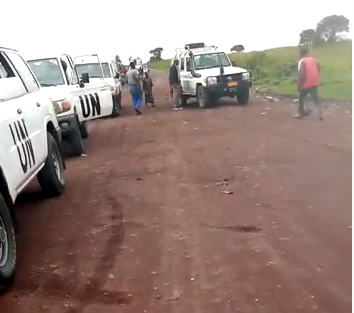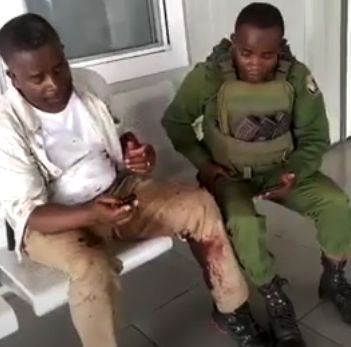By Jacques Bahati
February 24, 2021
The world was shocked on February 22, 2021 when news of the ambush and killing of the Italian Ambassador to the Democratic Republic of the Congo (DRC) hit the media. What the world, and many media outlets, failed to report is that crimes like these are hardly new. The killing of such a high profiled political appointment as Ambassador Luca Attanassio only brought attention to a crisis that the Congolese have been facing in this region for over 20 years despite the presence of the United Nations (UN) peacekeeping forces. The high level of insecurity in this region of the DRC has been ongoing with the most recent events being the killing of Ambassador Attanassio.
Italian Ambassador to the Democratic Republic of the Congo, Ambushed and Killed
On February 22, 2021 at 10:15 am, the Italian Ambassador Luca Attanasio, his bodyguard Mr. Vittorio Iacovacci, and Mustapha Milambo, World Food Program driver were ambushed and killed in an attack by an armed group in the DRC. News organizations reported this as a failed kidnapping attempt. Carly Nzanzu Kasivita, North Kivu Province Governor, made the announcement that:

“It is with sadness that we announce the death of the Italian Ambassador, his bodyguard and a Congolese driver who were initially kidnapped by a group of bandits who had six weapons and who at first fired warning shots at the two World Food Program’s vehicles. The World Food Program convoy was going to Rutshuru for its school feeding projects, according to information we got from them and unfortunately members of the convoy were taken in the Virunga National Park. While walking they encountered park’s rangers and members of the national armed forces patrolling and who attempted to free the hostages. During the fire exchange the assailants preferred to shoot at the ambassador’s body guard and then shot the Ambassador. The FARDC (the national army) and the park rangers succeeded to free four people […] Of the seven people who were part of the convoy, three died as a result of this incident. They brought the Ambassador to the emergency [care] and unfortunately he died at the hospital. I spoke with the driver who was kidnapped along with the Ambassador and he told me everything that happened. The assailants spoke kinyarwanda.” (click here to listen)
The DRC’s Foreign Minister, H.E. Marie Tumba Nzeza also made a promise to “the Italian government that the government of [his] country will do everything in its power to find out who is behind this despicable murder.” Similarly Mr. David McLachlan-Karr, the Deputy Special Representative of the United Nations Secretary General in the DRC, said that these murderers will be “identified and pursued with the greatest determination” on radiookapi.net. These leaders’ words appear empty and may serve only as a distraction and an insult to the victims living in the region since no tangible and concrete action has been taken to curb the instability of the region.

The attack on the Ambassador happened around the Kibumba market near the town of the same name which is not too far from Goma, the capital city of the North Kivu Province according to one of the survivors, seated on a bench in the UN hospital, in a YouTube video. Road travel across the Eastern DRC, particularly in the area where the attack happened, is and has been known to be very dangerous ever since the 1996 Rwandan and Ugandan invasion.
Ambassador Luca Attanasio is one of many victims to this crisis
The DRC government has a challenging task at hand to restore peace. Armed criminality started as a direct result of the 1996 war and has worsened overtime as different players continue to benefit from the ongoing crisis and insecurity. The Kivu Security Tracker, a project of Congo Research Group and Human Rights Watch, has listed more than 150 armed groups in North and South Kivu Provinces. They document incidents related to armed conflict and political violence. Since 2017 and as of February 7, 2021 they have roughly documented 4,226 killings and 5,573 kidnappings.
On Tuesday February 23rd, the day after the murder of Ambassador Atanasio and companions, in Mugangu Village, in the territory of ‘Irumu, in Ituri province, 11 people were killed and a dozen houses were burned down by the Patriotic and Integrationist Force of Congo, a militia group. From Tuesday night through Wednesday, twelve people were killed in Kisima in the Ruwenzori sector and in the rural part of Oicha, in Beni territory in North Kivu Province. This double attack was attributed to the rebel group of the Allied Democratic Forces. On Sunday January 10, 2021, there was an attack on six park rangers on patrol. The rangers were all killed by armed men.
There is overwhelming photographic evidence of beheadings, dismemberments, disembowelment, and even cannibalism perpetrated by these armed groups. These bandits have killed people, rapped women, orphaned thousands of children, and impoverished countless families by kidnapping their loved ones for ransom. A parent who paid a $2000 ransom for the freedom of his two sons in 2019 told the Africa Faith and Justice Network (AFJN) that “We are more afraid of the government security forces than the armed groups.” His statement highlights the complexity of the problem in this region. Some of the armed groups use weapons sold to them by government soldiers and others are part of the now very lucrative kidnapping scheme. This instability has serious negative consequences for the economy of the region and for trust in the DRC security forces.
Where do we go from here?
It should not take the death of an Ambassador for the DRC government and the UN to bring to justice those who continue to perpetrate these evil acts. The cause of the insecurity in the region has been known for years (the DRC is home to one-of-the-largest UN peacekeeping force ever deployed). Yet, even with this external ‘peacekeeping’ body what has been achieved? If the government of Congo is serious about peace, it has to look within its forces and at the same time pursue all the rebel groups. No one can win a war if the enemy is within its own ranks. Bad apples within the rank and file of the national army must be rooted out and held accountable.
AFJN presents its deepest condolences to the families of all of the victims of the atrocities being committed in the DRC. Many Congolese share the grief, pain and the anguish of the families of the recent attack because they have been victims of the same or other armed groups. AFJN will continue our work in advocating for peace in the Eastern DRC especially North Kivu, Ituri, and South Kivu. It is unacceptable that people anywhere in the world have to live in constant fear and insecurity or are internally displaced. Let us pray and work towards true peace and justice in the DRC.
